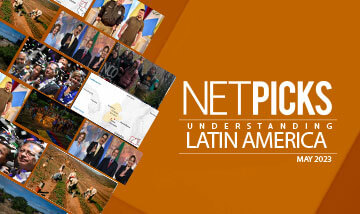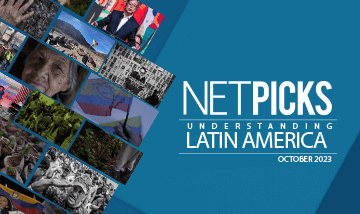Índice
- A CRUCIAL TEST FOR LULA
- A CONFLICT IN CHILE OVER MINERALS NEEDED FOR CLEAN ENERGY
- COLOMBIA ADOPTS AN UNPRECEDENTED ENERGY POLICY – BUT NEEDS HELP TO PULL IT OFF
- HOW A COLOMBIAN REPORTER PREDICTED HIS MURDER – AND WHY A GLOBAL TEAM IS FINISHING HIS WORK
- WHERE DOES CENTRAL AMERICA FIT IN A MULTIPOLAR WORLD?
Understanding Latin America
Dear readers and colleagues, this month we bring you five articles that reflect the reality of Latin America: one each from Brazil, Chile, two articles from Colombia, and another about the shifting geopolitical alliances in Central America.
- A Crucial Test for Lula
- A Conflict in Chile Over Minerals Needed for Clean Energy
- Colombia Adopts an Unprecedented Energy Policy—but Needs Help to Pull It Off
- How a Colombian reporter predicted his murder – and why a global team is finishing his work
- Where Does Central America Fit in a Multipolar World?
.
A CRUCIAL TEST FOR LULA
This article relays part of the history of Brazil’s Landless Workers’ Movement, or MST, which was born out of the struggle for land reform in the 1980’s when the country’s military dictatorship finally ended. The MST occupies and farms large landed estates, and forces the government to comply with the 1988 constitution that allows redistributing vast tracts of private, unproductive land to peasants. Since President Luiz Inácio Lula da Silva took office again this year, the MST has increased their occupations, putting extra pressure on the left-wing government to support their movement over the interests of large-scale agribusiness. But this article is also a response to an earlier piece published by the New York Times in April, reporting on this new wave of land occupations by the “Marxists” in Brazil, suggesting they are communists and criminals acting outside the law. While this may be the opinion of some in Brazil, what the NTY piece misses is this greater political and historical context of where the MST comes from, including clashes with Lula’s PT party in the past. As Lula’s third term in office gathers momentum, the MST aims to remind the president that its needs remain—and that they are not necessarily compatible with the desires of agribusiness. Can Lula avoid a growing battle with the country’s largest social movement?
Andre Pagliarini, May 5, 2023
https://www.dissentmagazine.org/online_articles/a-crucial-test-for-lula
.
.
A CONFLICT IN CHILE OVER MINERALS NEEDED FOR CLEAN ENERGY
Local citizens in the BioBio region in Chile have come head to head with the mining company Aclara Resources, in the latest battle over natural resources in South America. Aclara Resources is a Peruvian mining company seeking to extract rare earth elements from central Chile, highlighting that these minerals are needed globally to create the infrastructure needed for the clean energy transition. But in a community vote, 99% of local residents voted against the project, prioritizing the preservation of nature over the mining plans. They are also promoting the creation of a park in the area where the mining is due to take place. Aclara Resources’ plans would include producing 1,700 tons of rare earth concentrate annually for 15 years, using open-pit mining techniques over a 256-hectare area and include 13 hectares of native and endangered flora. This would affect the water supply of the nearby Penco City, an area with nearly 50,000 inhabitants. Chile’s BioBio region is one of the country’s most active areas for social mobilizations and won’t give up lightly. The authors are undoubtedly critical of the mining project in what seems to be an ongoing debate: what sacrifices should we be willing to make to create a global carbon free future? And what is really worth fighting for?
Julia Paley, April 25, 2023
https://fpif.org/a-conflict-in-chile-over-minerals-needed-for-clean-energy/
.
COLOMBIA ADOPTS AN UNPRECEDENTED ENERGY POLICY – BUT NEEDS HELP TO PULL IT OFF
Colombia President Gustavo Petro wants to stop what he calls the “economy of death,” which includes pivoting away entirely from oil, natural gas, coal and narcotics. This will not be easy, since oil and coal make up half of the country’s exports, but President Petro has already taken several steps to try to neutralize these industries. Upon taking office last year, he immediately declared a moratorium on new oil and gas drilling projects, in an attempt to phase out the industries, even though the finance and energy ministers refused to rule out future contracts, fearing the moratorium’s impact on the economy. He also proposed a significant new tax on oil exports, but rolled it back when this was met by widespread industry opposition. In addition to encountering significant resistance to his “green” plans, even from within his own party, Colombia is also dealing with a massive debt problem and is shackled to onerous interest payments, making this energy shift even more difficult. But Colombia’s policies are something new, and the world, in particular the United States, should be supporting it, says the author whose new book, Right Across the World: The Global Networking of the Far-Right and the Left Response, encourages left wing movements to create stronger ties globally to combat the rising popularity of right wing governments. It’s time for the U.S. to introduce a Green Good Neighbor Policy aimed at making Colombia and its energy transition the rule, not the exception, says the author.Will the world, and particularly the United States, put its money where its mouth is?
John Feffer, April 7, 2023
https://www.thenation.com/article/environment/colombia-energy-petro/
.
HOW A COLOMBIAN REPORTER PREDICTED HIS MURDER – AND WHY A GLOBAL TEAM IS FINISHING HIS WORK
In July of 2022, Colombian journalist Rafael Moreno defied his detractors, the people who had been threatening his life, and took to facebook to denounce all that he knew about an embezzlement scheme worth several million dollars. He denounced powerful local politicians, mining companies, paramilitary groups and other journalists. “If you’re going to kill me, then kill me. But I’ll tell you up front: you won’t silence me,” he said. Three months later, a man entered the bar that he owned, and shot him three times. He died instantly, but his stories did not. Days before he died, he managed to contact a French journalism nonprofit and uploaded all the information he had collected into an online encrypted journalism platform, so his investigations wouldn’t get lost in the case of his assassination. Now, the Guardian is one of 31 media partners worldwide who will pick up Moreno’s investigations where he left off, to highlight the work that ended his life. Journalism in Latin America, especially countries like Colombia or Mexico, has long been a risky and life-threatening career. Some journalists in Colombia backed down from their investigations after Moreno’s assassination. So what lead Moreno to take these extra risks, and what can we expect the Guardian and other media to uncover from his reporting?
Paloma Dupont de Dinechin, April 18, 2023
https://www.theguardian.com/world/2023/apr/18/rafael-moreno-colombia-journalist-murder
.
WHERE DOES CENTRAL AMERICA FIT IN A MULTIPOLAR WORLD?
In this article, the author examines the political alliances of Central American countries, many of whom are increasingly taking an anti-US stance in a region that has historically been closely connected to the United States. Honduras, for example, has long been a strategic ally of the U.S., but left wing president Xiomara Castro has repeatedly challenged those connections since taking office. This includes creating education agreements with Russia, insinuating publicly that the West was responsible for the war in Ukraine, and restoring connections with Venezuelan president Nicolás Maduro, etc. But it’s not only left-leaning governments that are taking a step away from silently complying with U.S. foreign policy. El Salvador’s President Nayib Bukele has also pivoted from earlier support of the U.S. administration. Last July, he responded to State Department corruption sanctions against five-dozen senior officers from Central American countries, including El Salvador, by stating in capital letters: UNITED FRUIT COMPANY. He has also accepted financing from China for megaprojects in the country, and has abstained from or skipped voting in the United Nations on any topics to do with the war in Ukraine. Is Guatemala a regional exception, the only country that has maintained its loyalty to U.S. foreign policy? The author suggests that this regional shift in geopolitical alliances is misguided, but it’s worth thinking more deeply about where this shift comes from exactly.
Roman Gressier, May 1, 2023
https://elfaro.net/en/202305/centroamerica/26813/Where-Does-Central-America-Fit-in-a-Multipolar-World.htm





